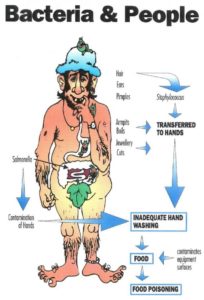What do bacteria need to grow?
Like most other living creatures, bacteria need warmth, moisture, food and time to survive and multiply.
Temperature
Bacteria will grow in temperatures between 4oC and 60oC. Below 4oC the bacteria do not multiply, but they will not die either. Temperatures over 60oC also stop bacteria from multiplying. Sterilisers on the slaughter floor and in boning rooms are used to kill bacteria on equipment and to stop bacteria multiplying.
Moisture
Most bacteria need water to grow; they cannot survive in dry conditions. That is why we try to keep boning room work surfaces dry.
Food
Bacteria need food to grow. Meat and fat are ideal foods for bacteria. It is essential we get meatworks totally clean at night to remove all possible food sources for the bacteria.
Time
Bacteria reproduce by splitting in half and forming two new bacteria. When there is warmth, food and moisture, bacteria can multiply every twenty minutes.
( Air – Not all bacteria need air to grow so even vacuum packed products can be contaminated.)
Where do bacteria come from?
Bacteria live just about anywhere where there is moisture and food. In a meatworks there are five most likely sources of bacteria.
Humans carry all sorts of bacteria on and in them. They are often carriers of Staphylococcus aureus or Staph. This lives in the hair, ears, nose, armpits, groin, cuts, pimples and boils as well as under jewellery. The intestines of humans can also have Salmonella and E.Coli which is in the faeces.
Animals or livestock carry bacteria like Salmonella and E.Coli. These are in the gut content and in the faeces. The manure or faeces on the outside of the hide or pelt is also a source of bacteria which can get on the meat during dressing of the carcase.
Soil and grass around the meatworks are home to a lot of different types of bacteria.
Walls, equipment and floors which are not regularly and properly cleaned carry bacteria.
Rodents, birds and insects can carry disease and will bring bacteria into the plant and onto the product.
How does bacteria spread?
Bacteria are great hitchhikers and will use any number of ways to move about meatworks.
- Humans carry bacteria on their bodies, boots and clothing. They pick up bacteria from one place and spread it around by touching and brushing against surfaces. They also cough and sneeze, further spreading bacteria. Infected sores always contain bacteria. If they are not covered they will contaminate work surfaces and product.
- If high pressure hoses are not used correctly they can blast dirt and bacteria off the floor and onto work surfaces and meat.
- Insects, birds and rodents like rats and mice carry bacteria which they can spread
How does bacteria get onto meat?
- Meat under the hide or pelt is free from bacteria unless the carcase is diseased. It is only during dressing and processing that contamination happens. There are a number of causes including the following.
- Workers who do not keep their hands, clothes and equipment clean can spread bacteria from themselves to the meat and from carcase to carcase.
- If the plant and equipment is not cleaned properly this will provide a breeding ground for bacteria. The meat will be contaminated when it comes into contact with the dirty surfaces and equipment.
- The hides or pelts of all livestock are covered with dust, dirt and manure. Bacteria breed on the hide or pelts of these animals. Bacterial contamination will be caused if workers let the hair or wool of an animal brush against the meat as can happen with flapping hides on cattle and roll back on sheep during dressing.
- Rodents, insects and birds landing on equipment, walking around and defecating can spread bacteria in a plant and onto the product.
- Even well dressed carcases have some bacteria on them after dressing. This is not a problem if it is kept to a minimum. However the problem occurs when even small amounts of bacterial contamination are allowed to multiply. Incorrect storage of meat is a major cause of microbial or bacterial growth. If not kept at a temperature below 4oC bacteria grows rapidly and meat goes ‘off’ very quickly.

